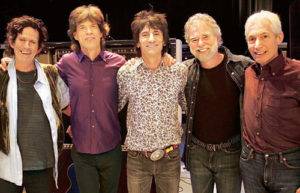With Hurricane Irma bearing down on the United States and possibly Georgia this weekend, Stan looks at the catastrophic storms of 1893 and 1898, the last major hurricanes to hit Georgia.
Category Archives: Places
Crush the Infamous
Heather Ann Thompson, Blood in the Water: The Attica Prison Uprising of 1971 and Its Legacy. Pantheon Books, 2016, 724 pp., $35.00.
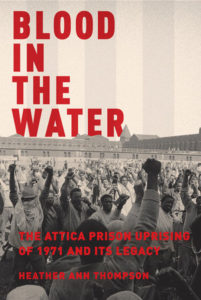 At the Henry W. Grady School of Journalism at the University of Georgia, the late great Conrad Fink—Marine lieutenant, former Vietnam War correspondent, Associated Press veteran, and journalist par excellence—taught us that above all our mission was to “comfort the afflicted, and to afflict the comfortable,” to shine the light in dark places. Wherever things are done—for good or evil—by public institutions, he said, they are done in the name of the people of this republic, and therefore the people will always have a right to know what is done in their name.
At the Henry W. Grady School of Journalism at the University of Georgia, the late great Conrad Fink—Marine lieutenant, former Vietnam War correspondent, Associated Press veteran, and journalist par excellence—taught us that above all our mission was to “comfort the afflicted, and to afflict the comfortable,” to shine the light in dark places. Wherever things are done—for good or evil—by public institutions, he said, they are done in the name of the people of this republic, and therefore the people will always have a right to know what is done in their name.
In a similar vein, Voltaire long ago taught us that we should always rage against injustice, and that those in authority will forever bear watching because they will abuse that power. When they do, call them to account for it in the strongest terms possible. Theodore Besterman, the legendary Voltaire scholar, said of his subject’s life’s work, “Voltaire did not destroy injustice, but he took the first step, he put the unjust on the defensive.” Voltaire’s motto toward the end of his life? “Crush the infamous.”
In the finest sense of both of these charges, Heather Ann Thompson has fulfilled that mission and has shined a bright light on one of the darkest places imaginable and one of the most disturbing episodes in American history, the 1971 Attica prison uprising and its aftermath. She has put injustice on the defensive and in so doing has won the 2017 Pulitzer Prize for history.
First, a full disclosure: Heather Ann Thompson is my friend. I’ve known her and her husband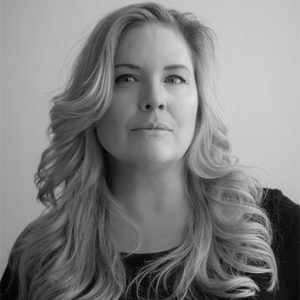 Jon Wells for years, and they’re both great scholars and terrific people, so I can’t pretend to be impartial about this book. I think it’s great and would like it had it won nothing but the Irving Forbush Prize.
Jon Wells for years, and they’re both great scholars and terrific people, so I can’t pretend to be impartial about this book. I think it’s great and would like it had it won nothing but the Irving Forbush Prize.
But of course you don’t have to take my word for it. The 2017 Pulitzer judges awarded this book the prize for history for “a narrative history that sets high standards for scholarly judgment and tenacity of inquiry in seeking the truth about the 1971 Attica prison riots.”
Tenacity of inquiry is putting it mildly. The state of New York has had a vested interest for over 45 years in making sure the truth of what happened at Attica—during the takeover by the inmates, during the retaking by the state, and the fallout afterward—never sees the light of day.
Why would this be so? The state’s actions at Attica—taken in the name of the people—should have been able to bear the scrutiny of the most thorough investigation. As Thomas Jefferson said, “It is error alone which needs the support of government. Truth can stand on its own.”
But this has never been the case. From that day to this, the highest officials in the state of New York have done their best to make sure that the real story of this tragic episode never got out. It defies understanding how an entirely different generation of people, many of whom were not even born in 1971, could still be complicit in continuing to cover up the truth about Attica. And yet the documentary and artifactual evidence of what happened during the five days of September 9-13, 1971, and for years afterward, has been distorted, hidden away, or deliberately destroyed.
In a truly remarkable achievement of historical research and journalistic detective work, Heather relentlessly pursued the story of Attica using every weapon at her disposal to uncover the full story of the Attica uprising, the state’s brutal retaking of the prison that killed both hostages and inmates, and the barbaric retaliation meted out to prisoners in the days, months, and years afterwards. Martin Luther King, Jr. famously said that “The arc of the moral universe is long, but it bends toward justice.” In light of the Attica story, one wonders.
In the months leading up to September 1971, many of Attica’s prisoners petitioned and crusaded for better conditions at the prison, to no avail. On the morning of Thursday, September 9, in an uprising that was totally unplanned and unrehearsed, prisoners seized a chaotic moment in which a door was unexpectedly locked to rise up in protest against prison conditions and within hours nearly 1,300 inmates had taken control of Attica Correctional Facility. Seizing state and civilian hostages working at the prison (who naturally feared for their lives but who were protected by the inmates), prisoners negotiated with state authorities for basic civil and human rights that they felt they’d too long been denied. With tensions mounting and fears for the hostages safety, Governor Nelson Rockefeller sent the New York State Police and Attica’s Correctional Officers in with tear gas raining down and guns blazing.
Twenty-nine inmates and ten hostages were killed, all by state authorities, and over a hundred more were shot. In the bloody aftermath the state retaliated unmercifully for the uprising by torturing prisoners with sadistic acts and denying them adequate medical care. The officials also lied to hostage families about who killed their loved ones, and to the American public about what really happened. From Governor Rockefeller on down, the state went to extraordinary lengths to cover up official actions, protect state police from criminal charges, all while denying any official culpability for mental and physical damage inflicted on hostage and inmate survivors and their families that continues to this day.
It’s a shameful story that Heather has dragged kicking and screaming into the light of day through Freedom of Information requests, interviews with survivors, over a decade of dogged research in archives across the country, and sheer determination to not let this story remain hidden from the public any longer. In addition to the adulation and prizes, she’s also received threats and been vilified.
As you would expect from a prize winner, this book is a compelling, page-turning read, but make no mistake: some of the graphic descriptions of what happened at Attica will—and should—turn your stomach.
The author’s attention to the smallest details is impressive. Just two examples among hundreds: on the morning the uprising began, Heather describes a moment when the inmates battered down a gate that didn’t just give way; one of the bars securing the gate to the cement “broke in half about fifteen inches down from the ceiling” (p. 54), a small nugget gleaned from a close reading of a very long after-action report. Similarly, after the retaking, inmates struggled to get word out to loved ones that they were alive, if not safe from state retribution and retaliation. They smuggled a red spiral-bound notebook from cell to cell, into which inmates wrote notes to family members in hopes it would get over the walls. State police confiscated it, and 40 years later Heather held it in her hands in a warehouse of the New York State Museum, its messages finally seeing the light of day. The notebook and the rest of the documents and artifacts she saw in that warehouse have subsequently disappeared.
After years of litigation, the state of New York finally settled with a group of former Attica prisoners in 2000, and with surviving hostages and their families in 2005. To date there have been no official apologies or admissions of wrong-doing, and no trooper or correctional officer was ever charged with a crime for their actions during the re-taking.
Blood in the Water isn’t just about what happened in 1971, of course. As we continue to live in the era of mass incarceration, the populations of this country’s ever-expanding prisons receive the least sympathy/empathy/understanding of all our fellow human beings. It’s customary for us to turn away from what happens behind those walls, secure in the knowledge that “whatever they get, they deserve. They should have thought about that before they raped, murdered, shot, stole, or…..” whatever else “they” did. When prison rebellions occur, our collective response isn’t to try to understand why, it’s to crack down even harder on the system and those in it.
What civil or human rights, after all, do convicted criminals have? That question always reminds me of the exchange between William Roper and Sir Thomas More in A Man For All Seasons, when Roper says he would cut down every law in England to get to the Devil. More replied, “And when the last law was down, and the Devil turned ’round on you, where would you hide, the laws all being flat? Yes, I’d give the Devil benefit of law, for my own safety’s sake!”
As Attica and its aftermath make clear, in a nation that holds any moral claims to standing for basic human rights, we turn a blind eye to what is done in our name—in prisons or anywhere else—at our own peril. This book is a reminder to we who need reminding that indifference to injustice and human suffering is obscene and immoral, no matter the source, and that in a self-governing republic power must always be held accountable.
As Voltaire said, “Every man is guilty of the good he did not do.”
Count Us In, Chuck
As long-suffering readers of this blog know well, I’ve had a long love affair with the Rolling Stones. I’ve seen them nine times in five different cities over the last 35 years, from the first time as a 17-year-old senior in high school to the last as a 50-year-old in the summer of 2015.
So imagine how Fan-Boy crazy I went when the Stones’ legendary keyboardist, Chuck Leavell, attended the Georgia Historical Society’s Trustees Gala in February in Savannah and yours truly got to sit with him at dinner. To say that I busted his chops would be an understatement. Turns out, he’s a huge fan of public television and was familiar with my own work on “Today in Georgia History.”
I first met Chuck for a few minutes when he gave the inaugural Mark Finlay Memorial Lecture 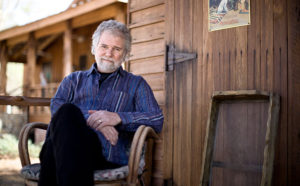 on environmental history at Armstrong State University in the spring of 2015. As you may know, Chuck and his wife Rose Lane turned her family’s plantation into a model tree farm outside Macon, and to say they’ve been good at it would be an understatement. They were jointly named National Outstanding Tree Farmers of the Year in 1999, and Chuck is the only two-time recipient of the Georgia Tree Farmer of the Year Award. The dedicated conservationist is the co-founder, with Joel Babbit, of the Mother Nature Network. In 2012 Chuck received a Lifetime Achievement Grammy for his work with the Allman Brothers Band as well as an Honorary Ranger award from the US Forest Service. Who else has done that? Take that Bob Dylan, with your Nobel Prize.
on environmental history at Armstrong State University in the spring of 2015. As you may know, Chuck and his wife Rose Lane turned her family’s plantation into a model tree farm outside Macon, and to say they’ve been good at it would be an understatement. They were jointly named National Outstanding Tree Farmers of the Year in 1999, and Chuck is the only two-time recipient of the Georgia Tree Farmer of the Year Award. The dedicated conservationist is the co-founder, with Joel Babbit, of the Mother Nature Network. In 2012 Chuck received a Lifetime Achievement Grammy for his work with the Allman Brothers Band as well as an Honorary Ranger award from the US Forest Service. Who else has done that? Take that Bob Dylan, with your Nobel Prize.
The husband, father, and grandfather is also an accomplished author of four books: Forever Green: The History and Hope of the American Forest; the autobiographical Between Rock and a Home Place; The Tree Farmer (a children’s book); and Growing A Better America.
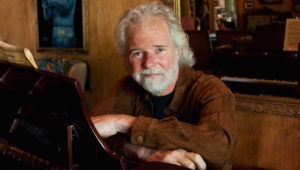 Besides his work with the Allman Brothers, Chuck’s recorded with Eric Clapton, George Harrison, the Black Crowes, Blues Traveler, Train, John Mayer, and many others, in addition to his own accomplished solo projects. The Alabama native attended the Georgia Historical Society’s Gala to honor Pete Correll, the longtime chief of Georgia Pacific and board member of the Mother Nature Network, who was appointed by Governor Deal and GHS as a Georgia Trustee this year.
Besides his work with the Allman Brothers, Chuck’s recorded with Eric Clapton, George Harrison, the Black Crowes, Blues Traveler, Train, John Mayer, and many others, in addition to his own accomplished solo projects. The Alabama native attended the Georgia Historical Society’s Gala to honor Pete Correll, the longtime chief of Georgia Pacific and board member of the Mother Nature Network, who was appointed by Governor Deal and GHS as a Georgia Trustee this year.
As in our first encounter, Chuck couldn’t have been more gracious. He is, in the words of Keith Richards, a gentleman through and through and as modest as they come. You’d never know he was at the heart of the Greatest Rock n’ Roll Band in the World, their keyboardist, erstwhile musical director, and the man who counts them in to nearly every song. Having been a Stones fan long before he became their keyboardist, Chuck in many ways is Mr. Everyman, standing in for all of us who love the band and their music dearly while spending the better part of a lifetime getting a nightly rear view—as Charlie Watts once indelicately put it—”of Mick’s bum wigglin’ about.”
And how’s this for coincidence: he made his debut with the Stones at their Atlanta concert in the Fox Theater on October 26, 1981—the first Stones concert I ever attended. Through the magic that is the internet, you can hear the soundboard recording of that magical night here.
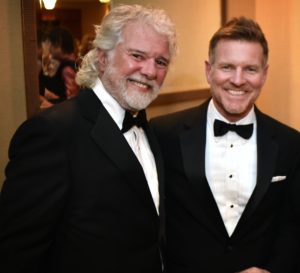 Without letting Chuck eat his dinner, I quizzed him about all things Stones, from how they stay so amazingly able to perform at such an advanced age (Mick exercises his body and voice relentlessly and rigorously watches his diet; Keith smokes and drinks), to Ronnie Wood’s newborn twins (for whom he’s given up smoking), to how long it’s all going to last. How do they first contact him to invite him to go on tour–does he look down at his cell and see Mick calling? (Sometimes, perhaps, but first the Stones’ manager Joyce Smyth sends out an email.) And so it went, on and on through every course. He answered my questions from the mundane to the sublime with unwavering politeness and an empty stomach.
Without letting Chuck eat his dinner, I quizzed him about all things Stones, from how they stay so amazingly able to perform at such an advanced age (Mick exercises his body and voice relentlessly and rigorously watches his diet; Keith smokes and drinks), to Ronnie Wood’s newborn twins (for whom he’s given up smoking), to how long it’s all going to last. How do they first contact him to invite him to go on tour–does he look down at his cell and see Mick calling? (Sometimes, perhaps, but first the Stones’ manager Joyce Smyth sends out an email.) And so it went, on and on through every course. He answered my questions from the mundane to the sublime with unwavering politeness and an empty stomach.
Many of my questions had to do with what they will and will not play live in concert, and why. As the group’s official “musical director” Chuck sets every show’s set list with Mr. Jagger and fights hard for songs that get rehearsed but rarely played live, like “Get off My Cloud” (hear Mick ask Chuck to count them in), “Lady Jane” and “Play with Fire.”
When I asked him why they don’t play early 60s standards like “Mercy, Mercy,” or “Walkin’ the Dog” live, he just laughed. He replied that people pay a lot of money to see them (don’t I know it!), and Mick and company feel they have to strike a delicate balance between playing familiar tunes like “Jumpin’ Jack Flash” that casual fans expect to hear, leaving little room for rarely played gems such as “She’s a Rainbow” and “Monkey Man” (both, incidentally, containing some of Chuck’s best work) for hard-core nuts like me.
Here’s what Chuck won’t tell you, though if you’ve followed the Stones during his tenure, you know it’s true: he’s made them a much better live band than they were before his arrival. They’re more professional, the songs are crisp and tight, giving their shows an energy and quality they lacked when everything was noticeably more ragged. In my opinion he’s a huge reason the band still plays to sold out audiences around the world well into their seventies.
know it’s true: he’s made them a much better live band than they were before his arrival. They’re more professional, the songs are crisp and tight, giving their shows an energy and quality they lacked when everything was noticeably more ragged. In my opinion he’s a huge reason the band still plays to sold out audiences around the world well into their seventies.
Chuck and Rose Lane have recently purchased a home in Savannah (not far from my office) and will be spending time here, so we’ll be neighbors for a few weeks each year.
The next sunny afternoon you stroll around Forsyth Park, you may see an unassuming white-haired, tree-farmer-looking gent walking beside you. If you pay him no mind and look the other way, you will miss the man who has been an integral part of musical history for the last third of a century and a well-respected member of rock royalty.
Take it from me: he won’t mind if you walk up and say, in Mick’s immortal words, “Please allow me to introduce myself….”
Tell him Stan said hello. And for all the pleasure—dare I say Satisfaction–you’ve given us through the years, Chuck, a heartfelt and sincere thank you. I like it, like it, yes I do.
Guilty as Charged
A lot of people in Atlanta took umbrage at Dan Shaughnessy’s column in the Boston Globe about how disappointed the New England Patriots must be in having to play the Falcons in the Super Bowl. He didn’t really say anything bad about the Falcons or Atlantans, oddly enough. The gist of his argument is that Atlantans aren’t die-hard professional sports fans (and thus aren’t worthy of a spot in the NFL’s big game), but are instead crazy about college football.
how disappointed the New England Patriots must be in having to play the Falcons in the Super Bowl. He didn’t really say anything bad about the Falcons or Atlantans, oddly enough. The gist of his argument is that Atlantans aren’t die-hard professional sports fans (and thus aren’t worthy of a spot in the NFL’s big game), but are instead crazy about college football.
Guilty.
Don’t get me wrong, I love and support all of Atlanta’s professional sports team, and have all of my life, as numerous of these tedious blog posts will attest. I stand second to none in my fanaticism for the Braves, Falcons, and Hawks. Heck, I even loved the long-defunct Atlanta Flames and still support them in Calgary. I know that they currently own the 8th and last playoff spot in the NHL’s Western Conference right at this red-hot second. Find three other people south of the Mason-Dixon line who care about that, I dare you.
But yes, college football is king here. And news flash: we aren’t alone.
The Northeast is the only place where the love of pro football wins out over the college game because, with the exception of Boston College (for whom our beloved Matty Ice played), there is no college football north of Philadelphia worthy of the name. Rutgers doesn’t count, despite playing—if you can call Rutger’s performance last year “playing”—in the Big Ten.
Combine that with the fact that the Patriots are really, really good—as are the other Boston teams usually—and it’s understandable why professional sports fans there are legion.
Our fanaticism here is not because of the dearth of professional championships in Atlanta sports.
It’s because college football is more exciting and more fun to watch, in my humble and uninformed opinion.
The rivalries are much more intense, and the game-day atmosphere at big-time college football games is unmatched in any other sport. Any. Shaughnessy referenced lack of excitement in Atlanta last April about a Celtics-Hawks playoff matchup (which the Hawks won, by the way). Is he kidding? Seriously? The NBA?
For game-day excitement, try the Big House in Ann Arbor when Michigan plays Ohio State (ask Michigan alum Tom Brady about it). Or the Horseshoe in Columbus when it’s played there. Or in Oklahoma during Bedlam. Utah during the Holy War or Oregon’s Civil War. Also try finding cool names like these for NFL rivalries. You won’t.
The NFL has nothing—nothing—to compare to the Iron Bowl. Or the World’s Largest Outdoor Cocktail Party. Notre Dame vs. Southern Cal. Texas and Texas A&M (though temporarily suspended). Catholics vs. Convicts.
I’m not saying there aren’t great rivalries in the NFL—the Redskins and Cowboys, Patriots and Jets, and Packers and Bears all come to mind. Heck, the Falcons and Saints don’t like each other. And the best rivalries in baseball are the Yankees and Red Sox and Cubbies vs. Cards.
But it’s not the same as the blood feuds in college football, where many of these rivalries go back 130 years. The NFL has been around since the 1920s, but most franchises—including the Patriots—barely predate the 1960s. And rivalries are divisional (Cowboys-Redskins) not geographical, like Florida and Florida State, and don’t have nearly the emotional intensity of a life and death college football grudge match.
Boston’s a great sports town, make no mistake, and I can understand how the mighty Patriots might have wanted to play a different team, with a greater championship legacy. It’s like Montreal playing Phoenix in the Stanley Cup—hockey in Arizona?
But here’s a fact: when the Patriots won their first Super Bowl in 2002, they had played previously in two Super Bowls (1986 & 1997), exactly one more than the Falcons (1998) at that time. And they had lost both of those games, to the more storied NFL franchises, the Bears and the Packers.
Yes, they’ve won four since, but we all have to start somewhere, including the Patriots. Pittsburgh had won 4 Super Bowl titles before the Patriots ever even appeared in the big game for the first time in 1986.
In sports as in life, all glory is fleeting. One should be wary of acting too smug about how supreme your team is over time. The Dallas Cowboys have wandered in the playoff and championship wilderness for 20 years now after Troy Aikman and Emmitt Smith retired, and perhaps that fate awaits the Pats once Brady and Belichick are gone—which they will be one day.
Brady is a once-in-a-lifetime QB, and Belichick a once-in-a century coach. Their impact on that team is not unlike Michael Jordan’s and Coach Phil Jackson’s for the Chicago Bulls in the NBA. How many titles have the Bulls won without them? Zero.
Like Cowboys fans now, one can easily imagine a time in the not-so-distant future when Pats fans might be thrilled to play in the Super Bowl again after a long, long dry spell that nobody ever foresees when the champagne is flowing. They might one day even be thrilled to be playing against the Atlanta Falcons.
Rise up.
The Roar of the Approaching Night
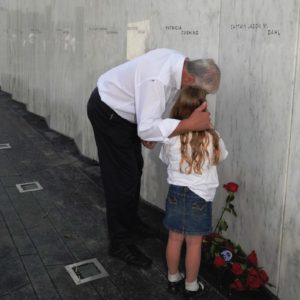 A recent story on the national park at the site of the crash of Flight 93 in Shanksville, Pennsylvania, brought back all the raw emotions of September 11. The anger, the terror, and the realization that our lives can change in an instant was never more starkly on display than on that sun-lit Tuesday fifteen years ago.
A recent story on the national park at the site of the crash of Flight 93 in Shanksville, Pennsylvania, brought back all the raw emotions of September 11. The anger, the terror, and the realization that our lives can change in an instant was never more starkly on display than on that sun-lit Tuesday fifteen years ago.
There will be many moments of reflection on this momentous anniversary. As we do, we should reflect on two other events from this past July that went by virtually unnoticed.
July 1 marked the 100th anniversary of the beginning of the Battle of the Somme during World War I. On July 2, Elie Wiesel died at age 87, the Auschwitz survivor who spoke eloquently for those 6 million who could no longer speak for themselves.
What will happen when those who give voice to hell in the flesh are gone?
At the anniversary of September 11, it’s worth remembering that every event in history that evoked raw emotions was in time smoothed over and faded from memory. In our own time, the Somme and Wiesel’s death should remind us what can happen when the voices of resentment become dominant.
We’ve already forgotten about the horrors of the Somme—and World War I in general. Probably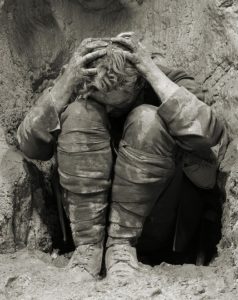 not one American on the street could tell you what happened in that murderous and savage battle. Or at Passchendaele or Verdun.
not one American on the street could tell you what happened in that murderous and savage battle. Or at Passchendaele or Verdun.
The Somme is a river in northern France, and the battle that took place there for 136 days in 1916 has become a metaphor for the useless slaughter of human life.
The Germans were securely entrenched and strategically located when the allied British and French forces launched their frontal attack on a 21-mile front north of the River. Before they sent the men over the top, they shelled the dug-in Germans with a week-long artillery bombardment. For the Germans living through it, it was hell: A soldier who suffered through the bombardment at Verdun said that by day nine almost every soldier was crying. The bombardment was so loud and so intense it could be heard north of London. When the shells subsided for an instant, the air was filled with the buzzing of millions of flies who were eating the dead, and the terrifying high-pitched screams of the rats who often grew so big and bloated from feeding on the dead, it was said that they would attack and eat a wounded man if he couldn’t defend himself. It brought catatonic depression, shell shock, madness.
Saturday, July 1, 1916, was the day of the biggest military fiasco in British history. At 7:30 that morning Field Marshal Douglas Haig, the commander of the British Expeditionary Force, ordered his men over the top, out of their trenches, to attack the German lines head on at the Somme. Within a matter of hours 21,000 British soldiers were killed, 40,000 wounded, many of them within sight of their own trenches.
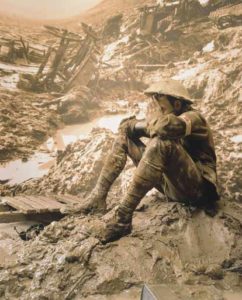 By noon 60,000 men lay wounded, dying, or dead. Let that soak in. 60,000. The Germans said they didn’t even have to aim, just shoot. The 1st Newfoundland Battalion lost 91% of its men within 40 minutes, which is why July 1 is Memorial Day in Newfoundland and Labrador.
By noon 60,000 men lay wounded, dying, or dead. Let that soak in. 60,000. The Germans said they didn’t even have to aim, just shoot. The 1st Newfoundland Battalion lost 91% of its men within 40 minutes, which is why July 1 is Memorial Day in Newfoundland and Labrador.
After that day, the Somme offensive deteriorated into a battle of attrition. In October torrential rains turned the battlefield into an impassable sea of mud, and by mid-November the Allies had advanced only 5 miles.
Between July and November 1916, there were an estimated 1.3 million Allied and German casualties on the Somme. Among the British losses 73,412 were never recovered or identified.
Let me repeat those figures: 1.3. million casualties in that one battle in a war that lasted over four years. Almost 75,000 missing. To give you some perspective, as of March 23, 2016, the total of those missing in action in Vietnam is 1,621.
All those deaths and mangled bodies, for what? A few yards of mud. Almost no one today can tell you anything about it, or explain how the war began in a toxic brew of ethnic hatred, religious animosities, and tribalistic territorial alliances.
The poison of the first world war culminated of course in the second one.
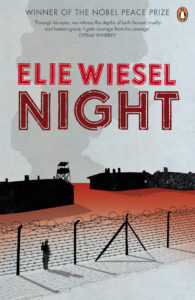 In 1956, Elie Wiesel published Night, his memoirs of his experience in the concentration camps: “Never shall I forget that night, the first night in camp, which has turned my life into one long night. Never shall I forget that smoke. Never shall I forget the little faces of the children, whose bodies I saw turned into wreaths of smoke beneath a silent blue sky. Never shall I forget these things, even if I am condemned to live as long as God himself. Never.”
In 1956, Elie Wiesel published Night, his memoirs of his experience in the concentration camps: “Never shall I forget that night, the first night in camp, which has turned my life into one long night. Never shall I forget that smoke. Never shall I forget the little faces of the children, whose bodies I saw turned into wreaths of smoke beneath a silent blue sky. Never shall I forget these things, even if I am condemned to live as long as God himself. Never.”
Wiesel recounted it all, including the murders of his father, mother, and sister.
The U.S. Third Army liberated Buchenwald on April 11, 1945. Among the survivors was Elie Wiesel.
“I must do something with my life,” he said years later. “It is too serious to play games with anymore, because in my place, someone else could have been saved. And so I speak for that person.”
The Somme and the Holocaust stand as warnings as we once again find ourselves grappling both at home and around the world with tribalism, revanchism, and nativism. We delude ourselves if we think these things cannot happen again.
The European Union has presided over peace in Europe for the longest period in its history, 71 years and counting, and it is imploding before our eyes in a swirl of economic unrest and ethnic hostility. We think that we are too superior to blunder blindly into another useless and forgotten conflict like World War I, leaving 37 million causalities behind. We are not.
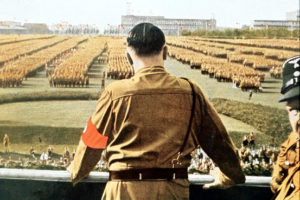 We think we would never allow something like the Holocaust to happen again, that we would see the madmen coming and cut them down before they turned the world into a charnel house again. Would we? Emotions flamed by legitimate fears of terrorism and fueled by religious and ethnic hatred raise troubling doubts.
We think we would never allow something like the Holocaust to happen again, that we would see the madmen coming and cut them down before they turned the world into a charnel house again. Would we? Emotions flamed by legitimate fears of terrorism and fueled by religious and ethnic hatred raise troubling doubts.
This September 11, along with the memory of our dead and the brave warriors who have since died fighting, remember too the dead of the Somme and the unchecked madness that allowed 6 million to be exterminated. The cult of resentment and fanaticism have their fatal and tragic consequences. Night may come again. If it does, humanity itself will be its author—and its final victim.
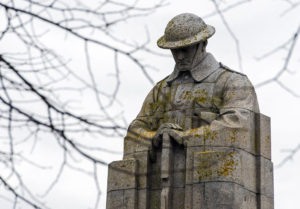 Elie Wiesel warned that “if we forget, we are guilty, we are accomplices.” 37 million casualties in World War I. Over 100 million in World War II. 6 million human beings in the Holocaust. Fifteen years after September 11 and every day forward, remember.
Elie Wiesel warned that “if we forget, we are guilty, we are accomplices.” 37 million casualties in World War I. Over 100 million in World War II. 6 million human beings in the Holocaust. Fifteen years after September 11 and every day forward, remember.
Remember.

